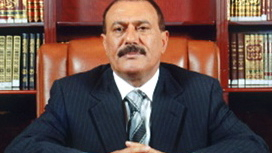Politics & Current Affairs
All Stories
Among the newly proposed federal budget cuts is $1.1 billion from the Department of Energy Office of Science which funds the majority of physics research at universities and national labs.
The Yemen expert gives a quick snapshot of the most important things you need to know about the country teetering on the brink of revolt.
Today, the morning after, it is time to ask ourselves some questions about what comes next for the Middle East, especially in Yemen, the base of operations for al-Qaeda in the Arabian Peninsula.
The end of the Mubarak regime in Egypt is likely to have a much larger impact on the region than the end of the regime in Tunisia, according to MEC […]
It’s hard to exaggerate how bad Hosni Mubarak’s speech was for Egypt. It is virtually impossible to conceive of a more poorly conceived or executed one.
Lately, both American and British policy makers have been thinking about how to bring some of the competitive discipline of the market to government programs.
How and why the Pentagon embraced the once-dreaded business of nation-building, and the “tectonic shift” that this new mission portends for American foreign policy.
The U.S. now incarcerates more people than any other country, largely as a result of soaring drug convictions, with a disproportionate number of African-American and Hispanic prisoners.
The Bureau of Labor Statistics announced the unemployment rate for January had fallen, but how could it decline so much if businesses added so few workers?
The fact that people are economically irrational shows us precisely why government safety-net programmes are necessary, says Mike Konczal at the Roosevelt Institute.
Prime Minister David Cameron has launched a devastating attack on 30 years of multiculturalism in Britain, warning it is fostering extremist ideology and contributing to Islamic terrorism.
The U.K. government’s child mental health strategy is a waste of money based on dodgy statistics. If there is a problem with childhood behavior, it is a crisis of adult authority.
Millions of people in the Middle East want freedom. Twenty years ago, the West was a role model, but it betrays its own values. It is also strengthening its enemy: militant Islamism.
Why are conservatives jumping on the bandwagon and shifting from “tough on crime” to “smart on crime.” Fiscal concerns are a motive, plus the failure of drug and criminal justice policies.
Parag Khanna says that a choice made ten years ago—not by the State department but by American universities—could have the greatest influence on whether new Arab governments move toward or away from the West.
The L.A. Times says the revolt in Egypt is an indigenous and broad-based movement galvanized by decades of corruption and poverty and the U.S. should let events play out.
Cameron’s plan to flog the public forest estate is opposed by 84% of the public. Stupid and destructive as this sell-off promises to be, it’s a stone’s throw from really interesting.
Last year, the Obama administration pushed through an ambitious transformation for NASA and turned to the commercial sector for astronaut transportation.
The state senator from Brooklyn, N.Y., wants to outlaw using an electronic device while crossing a big-city street on foot. The good intentioned law is overreaching, says Steve Chapman.
The economic downturn in the U.S. means it’s a good time to stitch together comprehensive and politically palatable policies on immigration reform.
Protests rocked Egypt, calling into question whether President Hosni Mubarak’s regime can survive. FP asked five top experts how Barack Obama should respond.
Can Western liberal capitalism learn to coexist with other styles, like those of China, India and Brazil’s swiftly developing economies? It can — and it must.
Walter Kohl, son of former German Chancellor Helmut Kohl, has published a tell-all book describing in moving detail his lonely childhood and the rift with his father.
In an action unprecedented in Internet history, the Egyptian government appears to have ordered service providers to shut down all international connections to the Internet.
If there was a central theme to the president’s remarks, it was innovation. He called for more investment in education, research, science and clean energy.
The global recession pushed climate change action toward the bottom of the geopolitical agenda. Yet President Obama bucked conventional wisdom Tuesday night by making clean energy technology a centerpiece of his State of the Union Address.
Has any concept more completely defined and disfigured public life over the last generation than so-called elitism? The term has created a broad and lasting culture war, says n+1.
The Dragon, a new privately funded spacecraft, should revolutionize American space exploration. And make clear the ability to commercialize innovation.
There is nothing better than being in a classroom with really, really brilliant students, and opening up new worlds to them in the way that a profession opened up new worlds to me.
How badly could things have gone during Chinese President Hu Jintao’s visit to Washington? How much room was there for actual negotiation?




